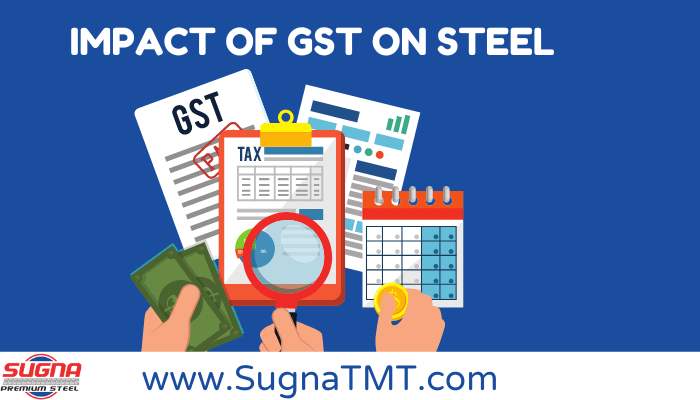The implementation of the Goods and Services Tax (GST) in India has been a transformative step in the country’s economic landscape. The steel industry, a crucial player in India’s development, has not been exempt from the effects of this monumental taxation reform. In this blog post, we will explore the various impacts of GST on the steel sector and shed light on how industry leaders like Sugna TMT have navigated through these changes.
Impact of GST on Steel

1. Simplification of Tax Structure:
One of the primary objectives of GST was to simplify the complex tax structure that prevailed before its introduction. The steel industry, which previously dealt with a multitude of taxes, now benefits from a unified tax system. This simplification has streamlined processes, reducing the compliance burden on steel manufacturers and improving overall efficiency.
2. Input Tax Credit (ITC) Advantage:
GST introduced the Input Tax Credit mechanism, allowing businesses to offset taxes paid on inputs against their final tax liability. For the steel industry, this has resulted in cost savings and increased competitiveness. Sugna TMT, being a leader in the industry, has adeptly utilized the ITC advantage to offer competitive pricing and maintain quality standards.
3. Supply Chain Efficiency:
The implementation of GST has led to a more efficient supply chain for the steel sector. The removal of inter-state barriers and the introduction of a seamless tax system have facilitated smoother movement of goods. This has not only reduced logistics costs for steel manufacturers but has also contributed to timely project deliveries.
4. Impact on Small and Medium Enterprises (SMEs):
While large steel manufacturers have reaped benefits from the GST framework, the impact on small and medium enterprises (SMEs) in the steel sector has been varied. Understanding the unique challenges faced by SMEs, industry leaders like Sugna TMT have played a vital role in supporting and collaborating with smaller players to ensure the overall growth of the sector.
5. Compliance Challenges:
Despite the positive aspects, the GST transition did bring about its share of compliance challenges for the steel industry. Adapting to the new tax regime required adjustments in accounting systems and processes. Sugna TMT, with its commitment to excellence, has successfully overcome these challenges and maintained a strong foothold in the market.
Summary:
In conclusion, the effects of GST on the steel industry in India have been both transformative and challenging. Through these changes, industry leaders like Sugna TMT have showcased resilience, adaptability, and a commitment to delivering quality steel products.
As the steel sector continues to evolve within the GST framework, staying informed about these impacts becomes crucial for businesses and stakeholders alike. Trust in the expertise of industry leaders, navigate through the challenges, and build a robust future for the steel industry in India.

